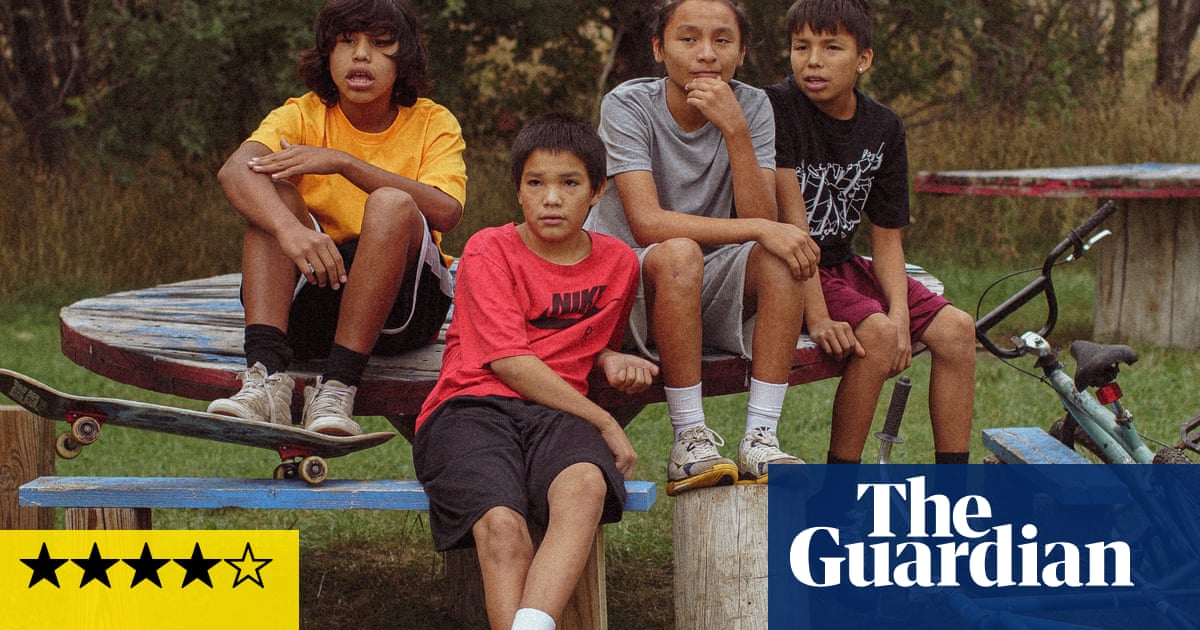
War Pony review – rousing tale of love and money on a Native American reservation
Riley Keough is an actor who establishes her film-making credentials with this terrific debut feature, co-directed with Gina Gammell. It is a movie set on and around the Pine Ridge Native American reservation in South Dakota and is scripted by Gammell with Bill Reddy and Franklin Sioux Bob. It’s a really heartfelt and absorbing story (with something of Chloé Zhao’s The Rider) about two young guys from the Oglala Lakota community, one about 12 or 13, the other 19 or 20. They are not known to each other, or at least not until the very end of the film. But the drama lets us see how much life experience they share, and how they could almost be the same boy at different times of life.
LaDainian Crazy Thunder plays Matho, a young kid with an aggressive, abusive dad. He has a crush on a girl in his maths class at school and has a sweet and almost romantic reverence for a children’s book he’s found about magic spells. But his relationship with his dad leads to disaster and he winds up living with a relative who deals in meth, and Matho – already way older and more careworn than his years – starts selling this at school, against his auntie’s express wishes.
Meanwhile, Bill (Jojo Bapteise Whiting) is a cool young guy we see cruising around town in an old car, and taking prison phone calls from the mother of his first son – she is jailed on account of some unexplained bail violation. Meanwhile, his second baby mama is utterly indifferent to him but Bill, with that unreliable cheeky smile that he evidently believes is very charming, assures her that he still loves her. And she is, in spite of herself, rather taken by Bill’s latest absurd scheme: he has bought a poodle called Beast. Co-caring for Beast will bring them and their son together, he says blithely, and he can sell Beast’s puppies for a lot of money.
Yet just as things start looking up, in their goofy way, a dark shadow settles. Bill gets a job for a white turkey farmer and it turns out his main work is going to be driving the young Native American women with whom this man is having illicit sex back and forth from the reservation. As a Native American, his presence makes this arrangement more discreet; he is complicit in exploitation and Bill is not so stupid that he does not understand this. Bill’s own friendship with this man and his unhappy wife, who are supposedly schooling him in the finer things of life such as wine, is due to turn very sour.
The movie shows us that what Matho and Bill have in common is a certain flair for entrepreneurship and bargaining over money. They both have scenes where they haggle over prices. These moments come because they are survivors and (of course) would-be thrivers, and they are natural risk-takers. And for all that their background is tough, they are instinctively gallant in their own way. When he hears the words of his new employer: “If there were no women in the world, money would have no meaning!” – you can see how Bill senses that there is something bizarrely crass in this supposed compliment, of which Bill would never be guilty. There is a lovely scene when Matho is telling his girlfriend about his tattoo and asks for a kiss; referring to the tattoo, the girl replies: “Does it hurt?” and he roguishly replies: “I’ll be gentle.”
Bill and Matho have this in common: they yearn to give love and they have an untrained aptitude for it – but they are both let down. Yet there is in their lives something genuinely uplifting and heroic.




































































